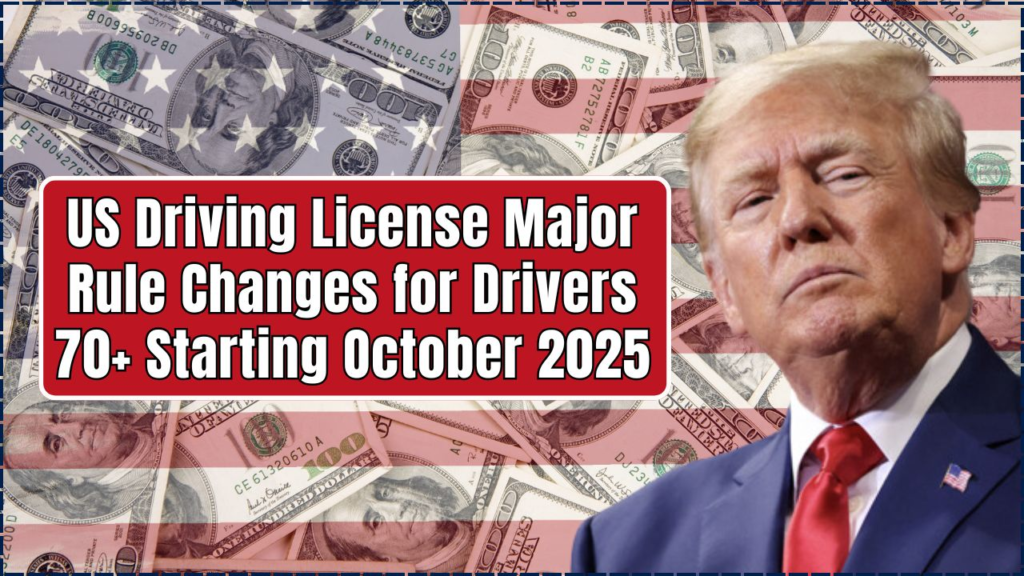
Rumors that sweeping new U.S. driving license rules will take effect in October 2025, requiring annual testing for drivers over 70, have circulated widely. Investigations show these claims are unfounded. Licensing rules remain set by individual states, many of which already impose additional requirements on older drivers. The debate, however, underscores the broader issue of how to balance safety and independence for America’s growing senior population.
US Driving License Major Rule Changes for Drivers 70+ Starting October 2025
| Key Fact | Detail |
|---|---|
| Federal rule in October 2025 | False – no national law requires new senior license tests |
| Senior-specific requirements | Vision exams, shorter renewal cycles, in-person renewals in some states |
| Example state change | Illinois raising mandatory road test age from 79 to 87 in 2026 |
The Rumor and Its Reality
In early 2025, viral social media posts claimed that beginning in October, all drivers aged 70 and above would face mandatory road tests, annual renewals, and potential license revocation. The posts framed the policy as federal law.
Fact-checking organization Snopes debunked these claims. No official legislation, press release, or announcement supports the rumor. The U.S. Department of Transportation has made no changes to national policy, and responsibility for licensing continues to rest with state governments.
Historical Context of Senior Driver Licensing
Age-based licensing rules in the United States began decades ago when policymakers linked aging with increased crash risk. Early measures included mandatory vision checks and shorter renewal periods for seniors. Over time, states adjusted thresholds based on research, often lowering or raising age cutoffs.
In Illinois, for example, senior drivers once faced annual testing beginning at age 75. That age later rose to 79, and will rise again to 87 in 2026, reflecting shifting views on fairness and safety.
State Rules Today
Vision Exams and Renewals
According to the Insurance Institute for Highway Safety (IIHS), 19 states mandate vision tests for drivers over a certain age. In-person renewals are required in at least 20 states, beginning as early as age 65 in some cases.
California requires vision exams at every in-person renewal, and mail renewals end after age 70. In Florida, drivers aged 80 and older must pass a vision screening with each renewal but may still renew online or by mail if requirements are met.
Shorter License Validity
Many states shorten license validity for seniors. While younger drivers may receive eight-year licenses, seniors often receive renewals valid for four years or less. This ensures more frequent check-ins with licensing authorities.
International Comparisons
The U.S. approach contrasts with other nations:
- United Kingdom: Drivers over 70 must renew their license every three years, though no mandatory road tests are required unless medically flagged.
- Canada: Some provinces require written exams and medical reports at age 80.
- Japan: Drivers aged 75 and older must take cognitive function tests and may face stricter renewal cycles.
Experts note these international models reflect similar concerns about aging populations and traffic safety, but approaches differ widely.
Safety and Risk Data
Crash statistics show mixed patterns. According to the National Highway Traffic Safety Administration (NHTSA), drivers over 70 have fewer crashes per capita than younger groups, but when accidents occur, they are more likely to be serious due to frailty.
Fatal crash rates per mile traveled are highest among the oldest drivers, particularly those aged 85 and above. Researchers emphasize that medical conditions, slower reflexes, and vision decline contribute more than age itself.
Policy Debate
Advocates for stricter testing argue that additional safeguards protect both seniors and the public. “Vision loss, slower reaction times, and cognitive decline are real risks that need attention,” said Lisa Robinson, a program manager at the Governors Highway Safety Association.
Senior rights groups disagree. They argue that blanket policies risk discrimination. “Age should not be the sole criterion,” said David Yang, executive director of the AAA Foundation for Traffic Safety. “The ability to drive safely varies greatly among individuals.”
Human Impact
For many seniors, driving means independence. Losing a license can mean relying on family, public transport, or costly ride-sharing.
Mary Sullivan, 74, of Florida, described her experience: “I passed the vision test easily, but when rumors spread about October 2025, I worried I’d lose my car keys for good. It’s frightening when misinformation spreads so fast.”
Technology and the Future
Automotive technology may offer alternatives to blanket testing rules. Advanced driver assistance systems (ADAS), such as lane-keeping support and collision warnings, reduce crash risks. Autonomous vehicle development also raises questions about long-term senior mobility.
Health technology may also play a role. Wearable devices that monitor reflexes or cognitive performance could inform future licensing decisions, offering more individualized assessments.
Practical Guidance for Seniors
Experts recommend proactive steps for older drivers:
- Schedule eye exams regularly to ensure vision meets state standards.
- Renew licenses early to avoid last-minute complications.
- Keep medical documentation ready for any required forms.
- Consider senior driver refresher courses, such as AARP’s Smart Driver program, to stay updated on traffic law changes.
Failure to follow state rules can result in fines, suspension, or revoked licenses. Officials emphasize that the best way to avoid penalties is to confirm state requirements well before renewal dates.
Looking Ahead
No sweeping federal policy will take effect in October 2025, but debate will continue. State legislatures are likely to adjust rules as America’s population ages. By 2030, one in five U.S. drivers will be over 65, according to Census projections.
Experts agree that ability-based assessments, supported by technology and medical oversight, will define the future. The challenge will be ensuring road safety without undermining the dignity and independence of older adults.
FAQ About US Driving License
No. Rumors are false. All licensing rules remain state-based.
Examples include California, Florida, and Illinois, each with specific requirements for vision tests, in-person renewals, or shortened license periods.
Supporters say medical decline can affect driving ability. Opponents argue age is not a reliable indicator and rules risk unfair discrimination.


















